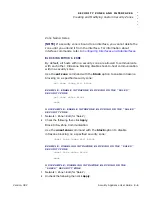
. . . . .
S E C U R I T Y Z O N E S A N D I N T E R F A C E S
Configuring Interface Modes
Version 3R2
Security Appliance User Guide
3-11
G U I E X A M P L E : D E L E T I N G T H E S U B I N T E R F A C E E T H 0 . 1 2 0
1
Network > Interface >
Remove (for eth0.120)
2
Select the following:
Are you sure you want to remove: Yes
. . . . . . . . . . . . . . . . . . . . . . . . . . . . . . . . . . . . . . . . . . . . . . . . . . . .
C O N F I G U R I N G I N T E R F A C E M O D E S
You can configure interfaces with one of thre interface modes that
determine whether the source IP address of traffic is translated to the IP
address of the egress interface. The thre interface modes are NAT-
enabled, route and transparent mode. You can configure additional NAT
policies, such as one-to-one NAT, many-to-one NAT, many-to-many NAT
and port address translation (PAT), through security policies. For
information on configuring NAT through security policies, refer to
Chapter 10, “Address Translation.”
CONFIGURING NAT-ENABLED MODE
Interfaces configured with NAT-enabled mode translate the source IP
address of all traffic to the IP address of the egress interface. This
configuration enables the appliance to hide the IP addresses of hosts on
the interface configured in NAT-enabled mode from remote hosts.
Use the
set interface
command with the
nat
option to configure NAT-
enabled mode on an interface:
set interface {interface name} nat
Figure 3-7
displays a network diagram of an appliance with the eth0
interface configured in NAT-enabled mode. When a host on the eth0
interface needs access to information located on the Internet, the source
IP address of all traffic from that host is translated to the IP address of






























